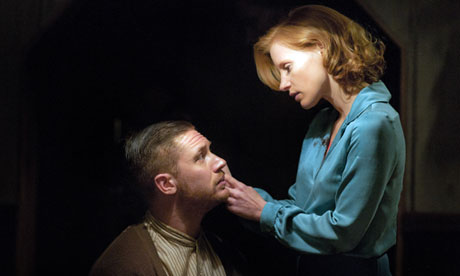
Australian-born film-maker John Hillcoat is an often underrated auteur whose arresting filmography spans the broiling prison rebellion of Ghosts… of the Civil Dead, through the rugged western terrain of The Proposition to the bleak apocalypse of The Road, the last beautifully (but unpopularly) adapted from Cormac McCarthy's famously "unfilmable novel". Collaborating frequently with writer and composer Nick Cave, Hillcoat returns obsessively to themes of familial loyalty and modern mythology, with a quasi-biblical sense of archetypal justice and retribution often firing the infernal engine of his dramas.
Fittingly, family, mythology and vengeful justice are all at the heart of Lawless (2012, Momentum, 18), screenwriter Cave's adaptation of Matt Bondurant's visceral historical novel The Wettest County in the World. Handsomely set in prohibition-era Virginia (Benoît Delhomme's location cinematography conjures a perfect blend of pastoral lyricism and brutal violence), the film follows the changing fortunes of the Bondurant brothers, romanticised bootleggers whose growing moonshine empire attracts the attentions of Gary Oldman's Capone-esque mobster, Floyd Banner, and Guy Pearce's scary-haired lawman, Charlie Rakes. That Tom Hardy should be utterly believable as the rugged Forrest Bondurant is unsurprising, his combination of unfussy thespian subtlety and overpowering physical presence recalling the heyday of Oliver Reed.
In Hardy's imposing company, former charisma-vacuum Shia LaBeouf ups his game, reminding us of the promise he once exhibited in A Guide to Recognising Your Saints and briefly expunging the spectre of the abysmal Transformers franchise (LaBeouf has since worked on Lars von Trier's solidly non-mainstream Nymphomaniac – watch this space).
Meanwhile, a soundtrack that brews up a heady cocktail of the old and new boldly juxtaposes the voice of bluegrass star Ralph Stanley with songs by Captain Beefheart and the Velvet Underground to fine disorientating effect. Disappointing, then, that performers of the calibre of Jessica Chastain are given so little to do other than observe, support and too often suffer in silence. To some extent, this is an inevitable side effect of the narrative, which paints an unapologetic picture of brothers in arms in a man's world. Yet there are several occasions where one wonders whether the story wouldn't actually be more interesting (even dramatic) if told from the point of view of the women who are constantly sidelined. The result is a film shot through with authenticity, machismo and grit, which, despite the unabashed ancestral affection of Matt Bondurant (who joins Hillcoat on the commentary track), sometimes leaves the viewer's heart untouched.
At the forthcoming Golden Globes, Helen Mirren and Sienna Miller will compete in the film and TV best actress categories respectively, appearing opposite Anthony Hopkins and Toby Jones, both of whom play versions of Alfred Hitchcock. While Mirren's Alma Reville serves as the maestro's guardian angel during the making of Psycho, in The Girl (February, BBC, 15), first seen on BBC4 over Christmas, Miller's Tippi Hedren is an abused starlet whose suffering while filming The Birds drives this wantonly partisan account of Hitch's more horrible side.
Publicly endorsed by Hedren (to the outrage of some diehard Hitch devotees), Julian Jarrold's spicy TV movie benefits from a barnstorming performance by Jones, who brilliantly captures the gait, stance, voice and – most impressively – presence of cinema's most celebrated voyeur.
With South Africa doubling for California, and excellent production design taking the viewer right back to the early 60s, this very enjoyable exercise in cineaste feather-ruffling makes an interesting double bill with Sacha Gervasi's Hitchcock, which similarly addresses the director's signature obsessions, albeit in altogether more sympathetic tones. I like the fact that The Girl is so single- (nay, bloody-) minded in its iconoclasm, giving Hedren's account a cracked and ever so slightly deranged quality that is perfectly suited to the story. Hats off to Miller, too, for holding it together amid the flurry of pecking predators and providing a believable portrait of caged beauty under duress.
In 1994, 13-year-old Nicholas Barclay disappeared from his home town in Texas. Three years later, a young man with a French accent turned up in Spain claiming to be Nicholas and recounting traumatic tales of abduction and abuse. Although he bore little physical resemblance to the lost boy (his eyes were a different colour), this latterday Martin Guerre was welcomed into the bereaved Barclay home, where he temporarily filled a gaping void in the devastated family's life. Just as Henry Joost's 2010 Catfish (which similarly became a Sundance festival documentary sensation) raised queasy questions about film-makers' complicity, so Bart Layton's The Imposter (2012, Revolver, 15) makes for uneasy if engrossing viewing.
Using interviews, home videos, recorded phone calls, snippets of pop culture and highly stylised reconstructions, this dramatic account of stranger-than-fiction events revisits a story that inspired the French fiction feature The Chameleon. At its heart is the on-camera testimony of Frédéric Bourdin, a damaged pathological liar and serial impersonator who "always wanted to be someone else" and whose exploits have become the stuff of urban legend.
Although undeniably intriguing, Bourdin's (self-serving?) role in the film will trouble those suspicious of his declared search for "love and affection", a search that has seen him prey upon those who have lost loved ones and whose need for closure frequently overwhelms rational inquiry.

